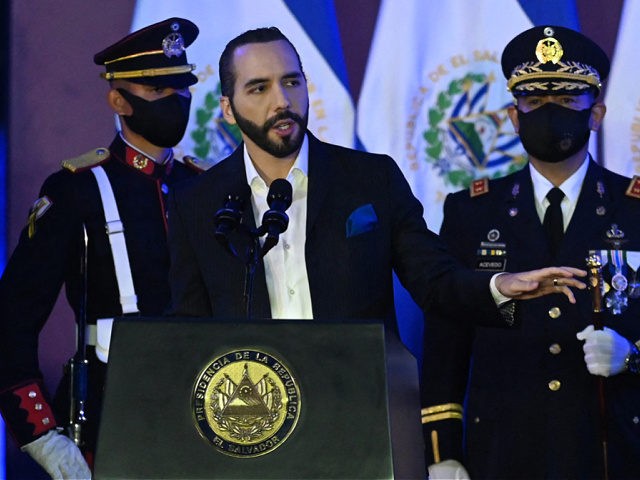A coalition of U.S.-born and immigrant Salvadorans is urging Vice President Kamala Harris to recognize the small country of El Salvador’s right to pick its own judges.
The members of the Salvadoran diaspora in Los Angeles came out this weekend to support the decision by the elected Salvadoran President Nayib Bukele to replace several Supreme Court judges.
Bukele’s policy is being rebuked as “authoritarian” by Democrat lawmakers and the Biden administration, which has close ties to left-of-center progressives groups in the small Central American country of over 6.5 million people.
“Most of the people here are registered Democrats,” an unidentified pro-Bukele protester declared in Spanish on Sunday in Los Angeles’ MacArthur Park. “Mrs. Kamala Harris, be careful when you make assertions about Bukele because we supported you so that you can serve as vice president.” He continued, “The majority are Democrats here, Salvadorans, and we are going to take that into account if the Biden administration interferes with what is happening in El Salvador because what is happening in El Salvador is pure democracy.”
The protester indicated that Democrats could lose the support of Salvadorans if they interfere with Bukele’s actions, which the demonstrators believe is aimed at cleaning the government of corruption.
Simpatizantes de #NayibBukele piden que no haya injerencia estadounidense en #ElSalvador pic.twitter.com/SBajmFwHoa
— Soudi Jiménez (@SoudiJimenez) May 9, 2021
A different unnamed protestor said she is tired of being used as a political pawn by Democrats during election time and ignored once the election was over.
Another unidentified demonstrator asked VP Harris to move out of the way and just let Bukele, the most popular president in the Western Hemisphere, clean the Salvadoran country of corruption.
“We say to Vice President Kamala Harris, let our country, lawmakers, and our president clean the government of El Salvador of all corruption,” she proclaimed in Spanish.
Echoing the Trump-era rallies, she called Univision and Telemundo “liars.” Some Salvadorans held signs calling the news outlets biased for attacking Bukele without allowing him to explain his recent moves.
There were over two million Salvadorans residing in the United States as of 2017, according to the Pew Research Center.
A different study from the Pew Research Center determined that only an estimated 500,000 naturalized citizens of Salvadoran descent were eligible to vote in 2020, putting El Salvador in the last place among the top ten foreign countries with the highest share of immigrant eligible voters in the U.S.
That figure excludes U.S.-born Salvadorans, which means the number of eligible voters of Salvadoran origin is likely higher.
While not all eligible voters cast a ballot, a new study from the City University of New York (CUNY) revealed that a record number of Hispanics voted in 2020.
Bukele welcomed the support from the Salvadoran diaspora in Los Angeles and at a similar event outside the Washington, DC, building of the Organization of American States (OAS), which has joined the Biden administration, the European Union (EU), and United Nations Secretary-General António Guterres, to condemned Bukele’s judicial changes.
Los Angeles is home to the largest concentration of Salvadorans in the United States, including some living there for several generations.
We are here, because we support our President @nayibbukele and you need to go to #ElSalvador to see the reality we’re living right now!
Arena y el Frente are part of the past, the past that we don’t want to remember anymore! @OAS_official @CIDH @UnionEuropeaRD @KamalaHarris pic.twitter.com/qd7YwfjUaQ
— Wendy Clavijo (@wendykclavijo) May 9, 2021
VP Harris and Secretary of State Antony Blinken have also expressed deep reservations over Bukele’s judicial removals.
Sens. Bob Menendez (D-NJ) and Patrick Leahy (D-VT) have demanded the Biden administration make U.S. funding for the Salvadoran government contingent upon respect for democracy and judicial independence and the rule of law.
Meanwhile, President Biden has convened a commission to explore packing the U.S. Supreme Court with judges that agree with his plans after former President Donald Trump filled vacant seats on the land’s highest court with judges of his choosing.
Bukele’s New Ideas party recently won a supermajority in the Salvadoran Legislative Assembly, which subsequently voted to remove all five magistrates of the Supreme Court’s constitutional chamber considered corrupt by the ruling party. The president’s historic number of supporters backed the move.
Meanwhile, critics of the Salvadoran president, mainly members of the two parties that had a grip on El Salvador for decades, believe Bukele’s changes to the Supreme Court are unconstitutional.
In response to pressure from U.S. Special Envoy for the Northern Triangle Ricardo Zúñiga and NGO’s for Bukele to reverse his judicial changes, the Salvadoran president responded in Spanish via Twitter: “The changes we are making are IRREVERSIBLE. We will not go back to the past. We will go to the future. We would like you to join us, but if you don’t want to, we understand you.”
Para las voces que aún piden que volvamos al pasado.
Con mucho respeto y cariño:
Los cambios que estamos realizando son IRREVERSIBLES.
No vamos a volver al pasado, iremos hacia el futuro.
Quisiéramos que nos acompañaran, pero si no lo desean, los comprendemos.
Bendiciones.
— Nayib Bukele 🇸🇻 (@nayibbukele) May 12, 2021
Bukele again declined to meet with Zuñiga during his recent trip to Central America, but the envoy did meet with other Salvadoran administration officials.
President Biden tapped VP Harris to lead the administration’s response to the crisis at the U.S. southern border, significantly fueled by migrants from El Salvador, Honduras, and Guatemala, particularly unaccompanied children and families.
Nevertheless, Harris has refused to talk to Bukele about the migration crisis, choosing instead to criticize his choices that represent the will of the Salvadoran people so far.
Bukele has expressed support for keeping Salvadorans from leaving for the United States. The Central American leader worked with former President Trump on that front, to the dismay of some Democrats.

COMMENTS
Please let us know if you're having issues with commenting.